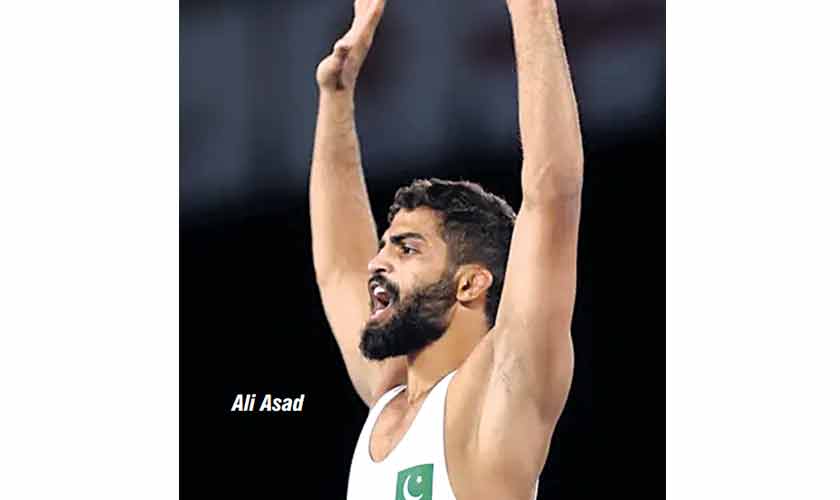[ad_1]
sSports in Pakistan have faced heavy losses due to doping scandals that have emerged one after another over the past few years. Recently, the talented wrestler Ali Asad failed a doping test. He was also stripped of his bronze medal which he won during the Birmingham Commonwealth Games recently.
It is a big blow to the country. Wrestling was the most successful discipline during the Commonwealth Games with Pakistan taking three silver and two bronze medals in that discipline – now it has been reduced to one bronze.
Ali Asad competed in the -57 kg weight class in the four-year event.
Prior to this case, Pakistan had suffered setbacks in weightlifting a few months back. Up to six weightlifters have been suspended for doping violations. Among them was Pakistani weightlifting champion Talha Talib, who finished fifth in last year’s Tokyo Olympics. Proceedings and weightlifters could face a lengthy ban.
It was, in fact, such a big blow for Pakistan ahead of the Commonwealth Games recently hosted by England that three of the six weightlifters qualified for the quadrennial event.
This year, seven Pakistani players have failed doping tests which have greatly damaged the sport’s credibility in the country. Pakistan is one of the most powerful kabaddi countries in the world but this episode has added to the pain of the Pakistan Kabaddi Federation (PKF).
The PKK has now decided to deal with this danger with an iron fist. PKF chose to conduct tests on its players when it learned that a local player had died after using steroids.
I will also mention here that the top three Pakistani athletes, Olympian Mehboob Ali, Hurdler Muhammad Naeem and Sprinter Samiullah, have failed doping tests and have been stripped of their medals which they won at the 13th South Asian Games in Nepal in 2019. These athletes are still serving a four-year ban.
The case forced the Pakistan Olympic Association (POA) to indefinitely suspend the Pakistan Athletics Federation (AFP) in December 2020 after the federation was said to have failed to cooperate with the investigation committee. The impasse continues.
At the 2016 South Asian Games in India, leading Pakistani squash player Nasir Iqbal failed a doping test, resulting in a four-year ban. He has now returned to the international circuit.
It appears to be an ongoing problem for the Pakistani sports circuit. The question now is: How do we deal with this matter intelligently in order to make our sport clean.
The Pakistani government will need to allocate a huge amount for doping tests. The National Anti-Doping Organization (NADO) cannot conduct random testing on a large scale unless the country pays it heavily. There is a great need for random testing during national camps and tournaments and before athletes leave for international events. If we can’t do that, things like this will continue and it will be a huge blow to our reputation in the international arena.
Besides random testing, it will be important that athletes are regularly informed about this issue and its effects on their lives and careers. Pakistan’s sports government bodies have started holding seminars and clinics in order to create awareness among the athletes. This practice should be normal now and should be intensified.
The athletes are the big culprits in this episode. Usually, athletes use these drugs secretly. According to my research and interaction with those who have used the drugs, we have learned that some have used such supplements at the suggestion of young athletes. Some claim that they took the dietary supplement without knowing that it may contain some banned substances.
Administrations must also play a vital role in eliminating this risk. The departments have first-hand knowledge about the athletes. If we screen athletes during departmental events as well as national games and national championships, I believe no one would use such banned substances to improve their performance. Departments must demote those athletes who fail doping tests. The authorities must take such strong steps if they are to check this risk. In strength sports in particular, great care will be required.
Moreover, the state should try to centralize the national camps. It is quite ironic that the majority of high level athletes undergo training on their own as the government is usually not able to give them ongoing camps if they are going to prepare for any major event. Even some athletes, such as weightlifters, train at home. The benefit of the central camps would be enormous. You can monitor the athletes accurately. You can observe what they eat while camping, no meal from outside the center should be allowed. Players’ lockers can be checked regularly and the type of medicines they keep in their nightstand drawers can be checked at random. Moreover, doping awareness campaigns can be easily conducted when athletes from different sports disciplines undergo training in the same centre.
Those who fail doping tests lead miserable lives. I’ve spoken to a few athletes who are serving suspensions. They are very unhappy. If these athletes were to lecture other athletes on a regular basis, it would certainly have a huge impact. There is no shortcut in life and athletes must learn that they need organic growth and must win titles based on their natural ability.
The use of anabolic steroids also has a negative effect on the athlete’s body. Many bodybuilders have lost their lives due to the use of anabolic steroids in recent years. So, needing an hour to stop this before it’s too late. Let us together wage war against this menace and eliminate it completely from our sports. I will stress that the State’s contribution to this matter will be much needed because the federations cannot do it alone. The tests are expensive and the process also takes a long time.
[ad_2]
Source link

